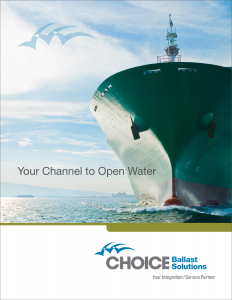Ballast Water Management Compliance
Are you prepared for compliance with BWM discharge standards?
Compliance is made of many parts:
- Installation and operation of a Ballast Water Management System (BWMS)
- Ballast Water Management Plans
- Documentation for Port State Control (PSC) Inspections,
- BWM Reporting,
- Biofouling Maintenance
- Training
The USCG reported that ballast water management documentation was one of the top reasons for increased deficiencies during PSC inspections. Ships failed to operate BWMS, had improper documentation on board (such as certificates), and failed to report discharges or operational problems.
BWMPS
Choice reviewed the BWMPs of several fleets and found that over 50% of BWMPs do not have the necessary documents for port State inspection.
Issues found include:
- Improper identification of BWMS,
- Lack of BWMS operational limitations,
- Incorrect certificates.
Choice can help prepare your ship for inspections by ensuring that all documents are in place.
Choice is your guide to worldwide compliance.
TRAINING
Many companies provide training specific to the operation of the BWMS. Choice provides training to your managers and crew to keep them stay apprised and aware of regulatory requirements and how regulatory authorities target ships.
The training assistance is interactive to ensure the topics of interest are included.
Choice uses their experience to educate managers and crew.
COMMISSIONING EFFICACY TESTING
Starting on 1 June 2022, all ships commissioning their initial ballast water management system (BWMS) installation will be required to undergo efficacy testing to verify that the BWMS can achieve the discharge standards in the BWM Convention (Resolution MEPC.325(75)). Approximately 40 companies have been approved as testing service providers. Choice is using their experience in the industry to help guide you through the process, review the options, and ensure that the commissioning testing is completed to minimize impact to the ship and crew.
Efficacy testing is required of the discharge from the BWMS after full treatment has occurred (e.g., uptake and discharge treatment of UV-based BWMS, including any applicable holding limitations). Clients may choose to also sample and analyze the uptake of ballast water to characterize the ambient water.
Commissioning testing should follow the guidance outlined in BWM.2/Circ.70/Rev.1, 2020 Guidance for the commissioning testing of ballast water management systems, and representative samples should be analyzed for two size classes of organisms (≥ 50 µm and ≥ 10 µm to < 50 µm). Testing also needs to assess the applicable self-monitoring parameters (e.g., flow rate, pressure, TRO concentration, UV transmittance/intensity).
The commissioning efficacy testing needs to be done to the satisfaction of the ship’s Administration (i.e., Flag) and responsible Classification Society. The International Ballast Water Management Convention (IBWMC) Certificate cannot be issued until the test report is issued and the testing results are satisfactory to the ship’s Administration. Any failure of test results will require additional testing.
Choice support includes:
- Evaluating approved testing companies,
- Identifying optimum time/place for testing,
- Assisting with scheduling of the testing, and
- Resolving problems with testing.
Choice’s experience in the industry can help you plan for a successful BWMS commissioning and operation.
BIOFOULING MANAGEMENT PLANS
Many ships have overlooked requirements for Biofouling Management Plans (BfMPs). The IMO, USCG, US Environmental Protection Agency, and many other localities require ships to have BfMPs – and new requirements are being developed.
BfMPs need to include more details that the basic templates provided by many. Choice can provide your ships with a simple, efficient biofouling plan that addresses all the requirements and needs for your ship’s area of operation.
BfMPs developed by Choice will include:
- Specifications on the coatings applied,
- Marine Growth Protection Systems (MGPS) information,
- Cleaning practices that minimize or reduce biofouling, and
- Any details required by local requirements.
Choice is pleased to offer a review of your BfMPs to identify information needed and where Choice BfMPs can be beneficial. Accurately accounting for the biofouling measures undertaken will also have a secondary benefit to help assess the fuel efficiency of your ship.
BfMPs are an integral part of controlling invasive species. Choice can help chart your path to compliance.


